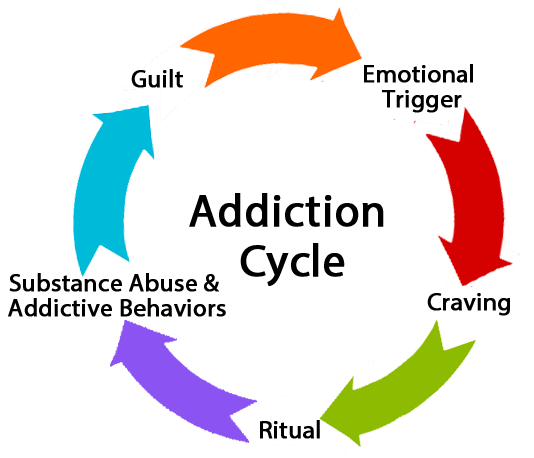ADDICTIONS
Addictions to certain substances or activities can be a chronic, often relapsing brain disease which may cause compulsive substance seeking and use (e.g. alcohol, drugs, nicotine, food) or compulsive activity (e.g. gambling, sexting, sex, porno, internet, shopping, eating) despite harmful consequences to the person who is addicted and those around them. Addiction to these substances or activities can become a brain disease if the abuse leads to changes in the structure and function of the brain. For example, although it is true that for most people the initial decision to take drugs or to engage in certain behaviors is voluntary, over time there can be changes in the brain caused by repeated drug abuse or possibly repeated behavioral activity which can affect a person’s self control and ability to make sound decisions, and at the same time send intense impulses to take drugs or engage in the activity.
There is a cycle to addiction that is important to understand. Addiction is not an easy road and inpatient or outpatient treatment is usually required to control the addiction.

The main obstacle to recovering from an addiction is denial. There are five steps to addiction recovery. The first is having a sense that one has a problem. The second step is gaining greater clarity about the nature of your addiction. At this point, the pattern of your problem behavior comes into focus, and you are able to recognize that you have a choice to make.
If you are going to be successful in the decision to stop the addictive behavior, you will benefit greatly from being willing to get support in devising a plan to achieve this goal.. The plan you choose to change your addictive lifestyle may include all aspects of your life: physical, mental, social and spiritual. Step three involves formulating such a plan.
Changing the way you think, feel and behave is not an easy task. Cognitive-behavioral therapy and learning Relaxation Techniques for Stress Relief can be very helpful in efforts towards recovery. Applying the necessary changes towards recovery is the fourth step.
Recovery, the fifth step, involves maintaining these changes and living a new and healthier lifestyle…
In my work with individuals, couples and families suffering from addictions, I can help address the following issues as you move forward to achieve a successful recovery:
- Identifying addictive behaviors and cycles
- Understanding the psychological components of addiction
- Assessing and creating a comprehensive treatment plan unique to you
- Repairing relationships effected by addiction
- Creating new and healthy patterns supporting sobriety
- Identifying and treating co-occurring anxiety or depression
Seeing a therapist does not mean that you are weak and do not have the potential to handle your problems. Therapy is for people who are smart enough to realize they need help. I can give you tools and support for re-framing your thoughts that will last a lifetime.
I believe that behind each person’s brokenness lies a dignity that makes positive growth possible. I also believe a process of true healing can happen as we work as a team to solve your problems.
I understand the pain and struggle of addiction. Call me to make the necessary changes from the inside out to take control of your addiction. I am ready to help.
Call 314-644-3339 for an appointment today!
Learn More :
Alcohol and Drug Addiction
Substance and Behavioral Addictions
Sexting Addiction
Client Testimonial :
After 17 months I am still sober, not a sip of anything! Thanks to you, I really have my life back! Exciting things have been happening…I am attending school, maintaining a great job, improving my relationships and living a healthier life. It has to do with putting myself in favorable situations and making the best of it . With all that you taught me, things have really turned out great since I put down the bottle. ~MG